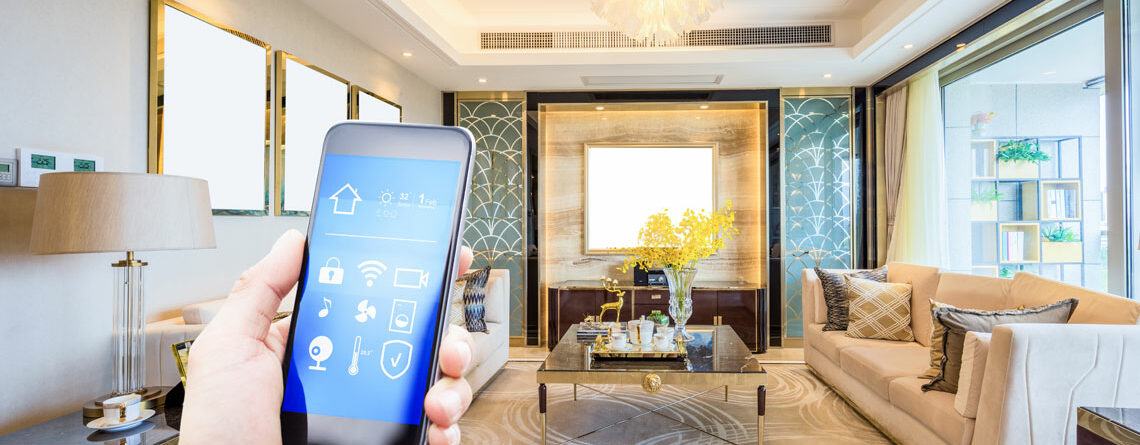Integrating Smart Technology for a Sustainable and Efficient Home
As our daily lives become increasingly intertwined with technology, the concept of a sustainable and efficient home is evolving.
The fusion of smart technology into our living spaces isn’t just about cutting-edge convenience—it’s an essential step toward energy-saving practices and sustainable living solutions.
Homeowners are steering toward an eco-conscious lifestyle, leveraging intelligent devices that automate energy use, diminishing excessive consumption, and promoting ecological responsibility.
From smart thermostats that adjust your home’s temperature to your daily rhythm to lighting systems that know when it’s time to dim, this is the new frontier for homeowners seeking to minimize their footprint without compromising comfort.
Engaging with these dynamic tools offers a practical approach to managing resources more judiciously, transforming residential energy practices, and contributing to a cleaner, greener world.
Embracing Smart Technology for Eco-Friendly Housing
As we advance towards more sustainable living solutions, integrating smart technology plays a fundamental role in adopting eco-friendly housing.
By prioritizing energy efficiency and green living, smart tech ushers in a new era where sustainable building practices are not just an aspiration but a reality.
Intelligent technologies, such as smart grids, have redefined how energy is distributed and consumed, offering a cleaner, more adaptable power system that can easily incorporate renewable sources like solar and wind.
Moreover, the architectural landscape is experiencing a transformation with the advent of smart buildings. These structures embody the essence of environment-friendly living, where Building Management Systems (BMS) command a significant impact.
BMS contributes to substantial energy savings and reduced carbon emissions by centralizing control of various systems, including lighting, HVAC, and security.
Additionally, integrating IoT sensors and energy storage options further facilitates the seamless automation of these buildings, creating responsive and adaptable living environments that epitomize sustainable living.
- Smart grids introducing enhanced efficiency and renewable integration
- Building Management Systems for centralized environmental control
- IoT and energy storage for adaptive, responsive green buildings
With the intersection of big data and AI, smart technology is taking giant leaps forward, aligning with the principles of green living through predictive energy management.
This smarter approach to energy usage reduces our ecological footprint and sets the stage for a resilient, environment-friendly infrastructure.
As we incorporate these advanced systems into our daily lives, from waste management to resource allocation, each step forward is geared towards a more sustainable future, deeply rooted in eco-responsibility and efficient living practices.
- Adaptable smart grids enhance energy reliability and sustainability
- Intelligent data-driven solutions for predictive maintenance and energy conservation
- Advanced waste management technologies promoting recycling and a circular economy
Sustainable and Efficient Home: Smart Integrations for Green Living
Creating a sustainable and efficient home design involves incorporating technology that contributes to energy conservation and supports a green lifestyle.
Embracing such innovations leads to an energy-efficient home and aligns with sustainable living solutions. From climate control to lighting and appliances, each aspect of a modern home can be optimized for energy savings and eco-friendly living.
Smart Thermostats and Climate Control
Utilizing smart thermostats is a step forward in managing your home’s temperature and energy use. These devices provide precise control over heating and cooling, enabling homeowners to adjust settings for optimal comfort while offering the convenience of remote access.
By learning from your habits and preferences, smart thermostats help reduce unnecessary energy usage and present valuable insights into your home’s energy consumption patterns, aligning with energy-saving tips for smarter living.
LED Lighting and Automated Illumination
LED lighting technology is celebrated for its minimal energy requirements and longevity, offering a bright solution for eco-conscious illumination.
Paired with automated systems, smart LED bulbs revolutionize how we light our homes. They detect the presence, adjust the intensity, and can even change colors to suit the occasion, significantly contributing to a more energy-efficient and adaptive living environment.
Intelligent Appliance Efficiency and Monitoring
Intelligent home appliances have radically transformed energy consumption in the modern household.
Remotely monitored and programmed for efficiency, these smart appliances adapt their operation to save power, whether a refrigerator that cools more efficiently or a washing machine that selects the optimal cycle based on load weight.
Harnessing such intelligent monitoring ensures that every kilowatt is used wisely—a foundational aspect of sustainable and efficient home design.
Battery Energy Storage Systems: Harnessing Renewable Power
The heart of an energy-efficient home may very well be a robust Battery Energy Storage System (BESS).
By storing surplus energy—often generated from renewable sources like solar panels—these systems make it possible to utilize clean energy on demand, even during peak usage or after the sun sets.
BESS represents a monumental leap towards self-sufficiency and is integral to forwarding the agenda of green living and sustainable living solutions.
Conclusion
The innovation of smart home technology has revolutionized the concept of living spaces, steering us towards a sustainable and efficient home.
Integrating smart devices, such as intuitive thermostats, responsive lighting systems, and energy-efficient appliances empowers homeowners with the keys to an energy-conscious lifestyle. This not only trims down utility bills but also plays a crucial role in diminishing the ecological footprint of residential dwellings.
Today’s eco-friendly housing is a testament to the synergy between cutting-edge technology and an unwavering environmental commitment.
Marking a paradigm shift in homeownership, these tech-driven advantages signal a new chapter in sustainable home design. From the meticulous management of everyday energy consumption to the broader strokes of green living, the movement towards an intelligent residence is gaining momentum.
Companies like HDL Automation are at the forefront of marrying innovation with sustainability, leading a charge that promises to redefine comfortable living standards without compromising our environmental responsibilities.
To wrap up, the journey towards an environmentally aware future is paved with smart choices—in our homes and lifestyles.
By embracing advanced technologies designed for the home, individuals take actionable strides toward preserving our planet while enjoying the comforts and efficiency of a modern, sustainable lifestyle.
With every smart device installed, we collectively edge closer to a future where green living and luxury go hand in hand, cultivating an energy-conscious lifestyle for generations to come.











